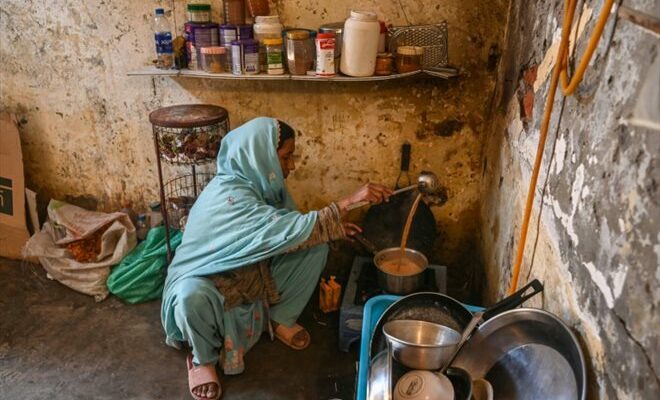Nadia, who dropped out of school to work and help her family financially, washes the dishes in their home on February 12, 2023 in Lahore, Pakistan (AFP/Arif ALI)
Every day, morning and evening, 16-year-old Nadia walks an hour from her house to her employer’s, stopping frequently along the way in the congested streets of Lahore, Pakistan, so that her mother can rest her tired legs.
Nadia was forced to drop out of school last year, well before graduation, and take a job as a cleaner, like her mother, to help support her family.
“She’s my daughter, but we had no other choice,” said the father, Muhammad Amin, a security guard who earns 18,000 rupees (64 euros) a month. “What happens next is up to God.”
The two women are walking together to reach nearby workplaces to save on transport costs, a common choice in Pakistan where millions of families are feeling the brunt of the economic crisis.
The country is on the verge of bankruptcy, after years of financial mismanagement and political instability. These structural weaknesses were exacerbated by the global energy crisis and the devastating floods last summer.
Caught in a spiral of indebtedness from which it is unable to extricate itself, Pakistan is close to defaulting on payment. He introduced austerity measures hoping to convince the International Monetary Fund (IMF) to disburse a further tranche of a $6.5 billion loan.

Security guard Muhammad Amin and one of his daughters on February 12, 2023 in Lahore, Pakistan (AFP/Arif ALI)
This week, the government increased a tax on imported luxury goods and services, saying it wanted to shift the burden to the wealthiest.
But he also cut gasoline subsidies and increased a general tax on goods and services, two measures that will affect low-income households.
“We can’t make ends meet, because we have to pay for gas, electricity and household expenses. So how could we put Nadia in school?” Pleads Miraj, Muhammad’s wife .
– School delay –
In Pakistan, consistently at the bottom of world rankings for gender parity, daughters are traditionally seen as a financial burden, due to the dowry that a bride’s parents must pay.

The daughters of Muhammad Amin do their homework on February 12, 2023 in Lahore, Pakistan (AFP/Arif ALI)
Muhammad invested in the education of his six daughters, sending them to cheap private school rather than free public school, with the hope that they would lift the family out of the endless cycle of misery.
Their destiny changed in 2015 when Muhammad, who was then earning a decent salary as a worker, was injured in a road accident and forced to find a less difficult but also less well paid job.
He resolved to let his wife work. But with inflation skyrocketing, their situation has not improved.
“We had to force Nadia to stop” at the end of primary school, he says, his voice filled with emotion.
The eldest of the family, the young girl was often responsible for caring for her sisters, which left her little time for her homework. She has thus accumulated a lot of academic delay, something also common in Pakistan.

Muhammad Amin (l), his wife Miraj Bibi (2nd d) and their daughters, on February 12, 2023 in Lahore, Pakistan (AFP/Arif ALI)
Miraj’s employer pays school fees for Nadia’s younger sisters. But the oldest of her youngest, 13, could still soon be forced to leave school.
After preparing the meal for the family and then cleaning up, Nadia collapses exhausted on the floor of their modest two-room rented house, while her sisters busy themselves with their homework.
– “It eats away at a mother” –
“We can’t manage to get by. That’s why I give all the salary I earn to my mother,” says Nadia, who hopes that by helping her parents, she will give her sisters a brighter future.
Pakistani President Arif Alvi said on Wednesday that half of Pakistani children between the ages of 5 and 16 are at risk of having to start working or begging.

Miraj Bibi, wife of Muhammad Amin and mother of Nadia, prepares tea for her family on February 12, 2023 in Lahore, Pakistan (AFP/Archives/Arif ALI)
More than 20% of some 220 million Pakistanis live below the national poverty line, according to the Asian Development Bank and the IMF, and inflation approaching 30% is only making the situation worse.
Wealth gaps are huge and tax evasion is happily practiced by the wealthiest. Tax revenues thus do not exceed 9% of GDP, compared to an average of 20% in Asia.
Nadia’s family has to make do with two meals a day. She has stopped buying milk and considers meat too luxurious and unaffordable.
“We don’t buy flour for the house, but we make sure to buy the children’s school books (…) and other things like uniforms,” says Miraj.
According to statistics from the World Bank and the IMF, the family is not ranked among the poorest, but life remains a constant struggle.
Even if the country manages to strike a deal with the IMF and then gets help from friendly nations, it will take months at best for the economy to stabilize.
Having his daughter’s future in jeopardy plunges Miraj into despair. “It gnaws at a mother inside,” she slips, crying.
© 2023 AFP
Did you like this article ? Share it with your friends with the buttons below.




